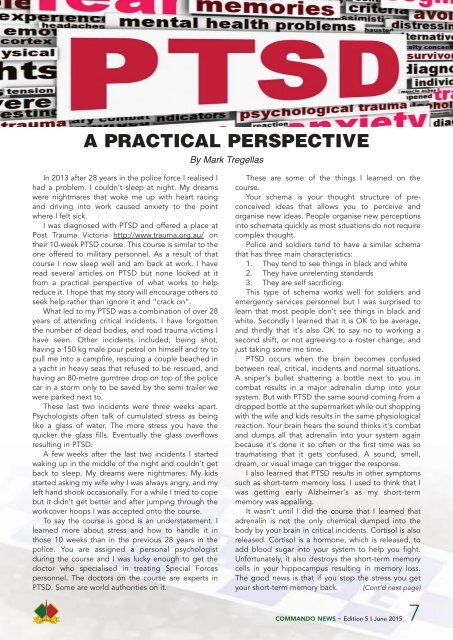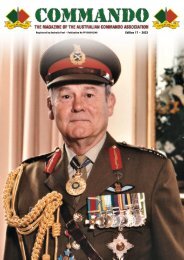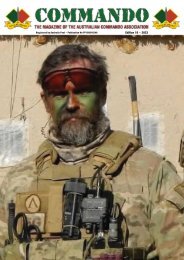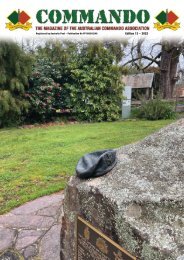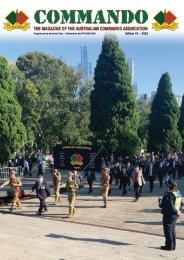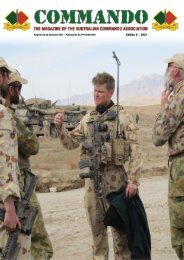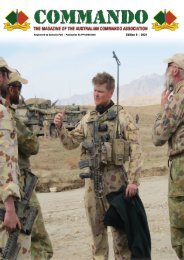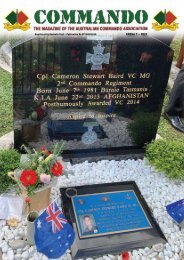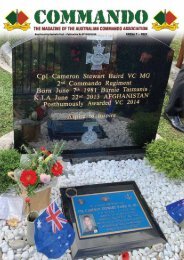AUSTRALIAN COMMANDO ASSN INC.
Create successful ePaper yourself
Turn your PDF publications into a flip-book with our unique Google optimized e-Paper software.
A PRACTICAL PERSPECTIVE<br />
By Mark Tregellas<br />
In 2013 after 28 years in the police force I realised I<br />
had a problem. I couldn’t sleep at night. My dreams<br />
were nightmares that woke me up with heart racing<br />
and driving into work caused anxiety to the point<br />
where I felt sick.<br />
I was diagnosed with PTSD and offered a place at<br />
Post Trauma Victoria http://www.trauma.org.au/ on<br />
their 10-week PTSD course. This course is similar to the<br />
one offered to military personnel. As a result of that<br />
course I now sleep well and am back at work. I have<br />
read several articles on PTSD but none looked at it<br />
from a practical perspective of what works to help<br />
reduce it. I hope that my story will encourage others to<br />
seek help rather than ignore it and “crack on”.<br />
What led to my PTSD was a combination of over 28<br />
years of attending critical incidents. I have forgotten<br />
the number of dead bodies, and road trauma victims I<br />
have seen. Other incidents included; being shot,<br />
having a 150 kg male pour petrol on himself and try to<br />
pull me into a campfire, rescuing a couple beached in<br />
a yacht in heavy seas that refused to be rescued, and<br />
having an 80-metre gumtree drop on top of the police<br />
car in a storm only to be saved by the semi trailer we<br />
were parked next to.<br />
These last two incidents were three weeks apart.<br />
Psychologists often talk of cumulated stress as being<br />
like a glass of water. The more stress you have the<br />
quicker the glass fills. Eventually the glass overflows<br />
resulting in PTSD.<br />
A few weeks after the last two incidents I started<br />
waking up in the middle of the night and couldn’t get<br />
back to sleep. My dreams were nightmares. My kids<br />
started asking my wife why I was always angry, and my<br />
left hand shook occasionally. For a while I tried to cope<br />
but it didn’t get better and after jumping through the<br />
workcover hoops I was accepted onto the course.<br />
To say the course is good is an understatement. I<br />
learned more about stress and how to handle it in<br />
those 10 weeks than in the previous 28 years in the<br />
police. You are assigned a personal psychologist<br />
during the course and I was lucky enough to get the<br />
doctor who specialised in treating Special Forces<br />
personnel. The doctors on the course are experts in<br />
PTSD. Some are world authorities on it.<br />
These are some of the things I learned on the<br />
course.<br />
Your schema is your thought structure of preconceived<br />
ideas that allows you to perceive and<br />
organise new ideas. People organise new perceptions<br />
into schemata quickly as most situations do not require<br />
complex thought.<br />
Police and soldiers tend to have a similar schema<br />
that has three main characteristics:<br />
1. They tend to see things in black and white<br />
2. They have unrelenting standards<br />
3. They are self sacrificing.<br />
This type of schema works well for soldiers and<br />
emergency services personnel but I was surprised to<br />
learn that most people don’t see things in black and<br />
white. Secondly I learned that it is OK to be average,<br />
and thirdly that it’s also OK to say no to working a<br />
second shift, or not agreeing to a roster change, and<br />
just taking some me time.<br />
PTSD occurs when the brain becomes confused<br />
between real, critical, incidents and normal situations.<br />
A sniper’s bullet shattering a bottle next to you in<br />
combat results in a major adrenalin dump into your<br />
system. But with PTSD the same sound coming from a<br />
dropped bottle at the supermarket while out shopping<br />
with the wife and kids results in the same physiological<br />
reaction. Your brain hears the sound thinks it’s combat<br />
and dumps all that adrenalin into your system again<br />
because it’s done it so often or the first time was so<br />
traumatising that it gets confused. A sound, smell,<br />
dream, or visual image can trigger the response.<br />
I also learned that PTSD results in other symptoms<br />
such as short-term memory loss. I used to think that I<br />
was getting early Alzheimer’s as my short-term<br />
memory was appalling.<br />
It wasn’t until I did the course that I learned that<br />
adrenalin is not the only chemical dumped into the<br />
body by your brain in critical incidents. Cortisol is also<br />
released. Cortisol is a hormone, which is released, to<br />
add blood sugar into your system to help you fight.<br />
Unfortunately, it also destroys the short-term memory<br />
cells in your hippocampus resulting in memory loss.<br />
The good news is that if you stop the stress you get<br />
your short-term memory back. (Cont’d next page)<br />
<strong>COMMANDO</strong> NEWS ~ Edition 5 I June 2015 7


